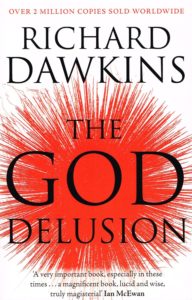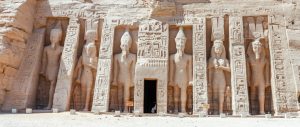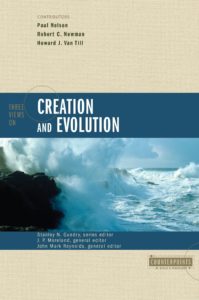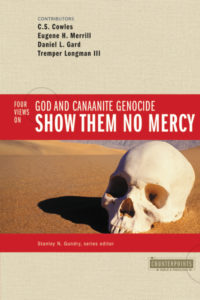This article is part of a three part series

Year Published
1990
Authors
Topics
Synopsis
Overall Rating
Final Thoughts
Year Published
1990
Authors
Topics
Synopsis
Final Thoughts
Overall Rating
The Fully Gifted Creation
Typically called “theistic evolution”, Van Til prefers to call his position “fully gifted creation” because, in his opinion, it better fits the idea of God created a creation that can sustain (and create) itself.
He begins is section by defining many of the things that are to be discussed, which I find rather helpful. Within these definitions, he makes a clear distinction between the doctrine of Creation and the concept of special creation. The doctrine of Creation is just that- God created the world. Every Christian throughout history has upheld this doctrine. The concept of special creation is what was called young earth creation earlier in this book. It’s the idea that God created the world in six literal days some 6,000 years ago, as told in the Genesis story.
The doctrine of Creation is not equal to the concept of special creation, and special attention must be paid to this differentiation, which most discussions on creation/evolution tend to ignore. They treat the doctrine of Creation as synonymous with special creation (especially those espousing a young earth creation view). This is problematic because it pits two things against each other which were not meant to be pit against each other- the Bible and science.
The problem is deepened by the fact that many also equate evolution with naturalism. That is to say, especially with deeply conservative Christian circles, evolution automatically excludes God. There is, however, a very important distinction between the concept of evolution and the worldview of naturalism (that nature is all there is) much like there is an important distinction between the doctrine of Creation and the concept of special creation.
Once we remember that difference we’re able to have an actual discussion about the merits of either viewpoint- special creation or evolution. Most Christians who uphold the concept of special creation argue for it by primarily arguing against evolution. Rather than using evidence for something, they do their best to find evidence against something else. In my opinion, as well as Van Til’s, this is a rather poor way to defend your position.
One of the ways young earth creationists try to refute evolution is by stating that randomness rules out purpose. The concept of evolution needs randomness in order for it to work. Christians view this as antithetical to creation in which God clearly made everything with a purpose. Van til uses the idea of a casino to illustrate the problem here. Casinos have a purpose- to make money. They also use randomness (a better word would be odds) to do this. They employ the odds of their slot machines and the odds of someone winning a card game in their favor to make money. The randomness does have a purpose, and they know that. Could not God have done the same thing?
There’s also a large portion of the Christian circles that pit science and theology against each other. In reality, they are very similar studies that theorize and try to find the best answer to a set of questions and observations, but about different things. Science discusses the natural world and what we see. Theology discusses the spiritual realm. Do they intersect? Yes. Do either of them give us a complete picture of anything? No, because we will always have limited human knowledge of everything. Does that mean we should neglect either of them? No way. They’re both important in their own way, as they’re both means by which we find the truth of God, His nature, and His creation (which he describes as good.)
Van Til notes a discontinuity amongst Christians. We love technology. We want the best medicine and doctors. We want to make sure we have the most up-to-date worship equipment in our churches and the best presentation software. And yet, when it comes to biological science (rather than chemical science [medicine] or electrical sciences [technology]) we suddenly shudder it. We try to censor it because we disagree with it. Why do we embrace so many scientific advances because they make our lives easier, but reject others simply because they make us think in new ways? That’s poor theology right there.
Van Til continues to point out the problems with reading Scriptures out of context. Too many Christians don’t go back to the historical and literary roots of a passage and simply take it however they wish it to be read. It’s a problem we’ve seen discussed in other parts of this book. As we continue to gain advances in science we continue to see how certain passages are figurative and will accept them as such. Perhaps the Genesis accounts of creation are becoming those as well. Let’s embrace this change as it gives us a better understanding of God and His creation. (However, we should not embrace it without proper investigation, but arguing against it alone does not do that either.)
If our theology fails to grow, what benefit is there to our continued reading of the Scriptures? If we’re not, daily, trying to better understand God, His nature, and our relationship with Him, then why do we bother doing theology at all? Christian theology, especially when it comes to the doctrine of Creation, has long been stagnant and refused to grow. It’s seen anything that’s different from it as a threat rather than a chance to know God better. That does a disservice not only to ourselves but to God because we’re refusing to grow closer to Him.
Once all these discussions and points are talked about, one can clearly see Van Til’s view of Creation. God created the world out of nothing and allowed it to do it’s thing, through unguided evolution, over millions of years until we get to the place we have today. This fits with, most, of the scientific evidence. And, most, of the Biblical evidence as well, if it’s read through a particular lens.
For Van Til, this view of creation is best because it gives God the most power and authority. Rather than creating a creation with “gaps” which he must then fill (through miracle or special creation events) this allowed God to set up a self-sustaining creation. For him, it shows a more powerful and resonant God.
Unfortunately, his presentation of such a view has left me unconvinced. He failed to talk about so many of the problems his viewpoint has. For instance, according to traditional evolution life came from non-life. This is a scientific impossibility. And yet, it’s ignored when discussing evolution, even by Van Til. Something must have happened for life to arise. He also fails to discussion the creation of man.
There are many theories of man within the theistic evolution viewpoint (a name which Van Til dislikes, but is ultimately what his viewpoint is) as for man. Some think God created Adam specifically. Others see apes evolving into man and then God re-purposing it from said animal into a human in God’s own image. Whatever happened, there is clear Biblical evidence that Adam and Eve were (at least thought to be) actual historical figures that actually did something bad and actually fell from God’s grace. Van Til’s view of creation, as presented in this book, fails to acknowledge or give an explanation for any of that, which I find very problematic. If your viewpoint cannot align with the Bible on such an important doctrine (the Fall is arguably the most important doctrine as it drives every other one) then how can your viewpoint be seen as valid?
While I admire Van Til for trying to intellectually reconcile scripture and science, he does so in a way that leaves God out of most things and fails to explain some important parts of scripture under his viewpoint.
Nick’s Final Thoughts
The doctrine of Creation is important. It’s vital for Christians to view the universe as a good thing created by God. The means of how that creation came to be is still unsettled. There’s much discussion to be had on either side. Could God have created the world in six literal days? No doubt about it. Did he, though? Probably not. There’s too much scientific evidence to say the opposite. However, I don’t think God took a hands-off approach to creation either. Yes, he set up the world with laws that govern itself (the weather, for instance) but that fails to describe the way life came to be, along with the creation and fall of man (at least from the ways the viewpoints have been presented within this book).




